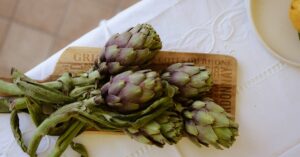Table of Contents
ToggleCooking can feel like a daunting task, especially for beginners who might think the only thing they can whip up is a bowl of cereal. But fear not! With the right techniques, anyone can transform into a kitchen wizard. From sizzling stir-fries to perfectly poached eggs, mastering a few essential skills can turn even the most hesitant home cook into a culinary champion.
Essential Cooking Techniques for Beginners
Understanding essential cooking techniques equips beginners with the confidence to enter the kitchen. Mastering knife skills proves crucial for efficient food preparation. Chopping, dicing, and mincing not only enhance presentation but also ensure even cooking.
Sautéing stands out as a versatile cooking method. Heat, fat, and ingredients come together in a pan, allowing for the development of rich flavors. Starting with garlic and onions adds a savory foundation to numerous dishes.
Boiling serves as a foundational technique for preparing various foods. Water’s bubbling action facilitates cooking pasta, eggs, or vegetables quickly. Maintaining an appropriate boil prevents overcooking while ensuring thorough cooking.
Roasting transforms food textures and flavors through dry heat. Vegetables, meats, and poultry gain a delightful caramelized exterior and a juicy interior. It requires an oven’s consistent temperature to achieve optimal results.
Braised dishes showcase the art of slow cooking. Combining searing with simmering allows tough cuts of meat to become tender and flavorful. This technique leverages low heat over extended periods, enhancing the dish’s complexity.
Baking relies on accurately following recipes and timing. It offers an excellent opportunity for beginners to explore measuring ingredients and understanding reactions. Breads, cakes, and cookies showcase how precise attention to detail can yield satisfying results.
Grilling introduces a smoky flavor that enhances meats and vegetables alike. Using a grill can create charred, flavorful dishes, perfect for summer meals. Timing and temperature control remain key to avoiding undercooked or overcooked items.
By embracing these essential techniques, beginners can master the art of cooking and gain confidence in their culinary journey.
Basic Knife Skills
Mastering basic knife skills is crucial for beginners in the kitchen. These skills not only improve efficiency but also ensure safety while cooking.
Types of Knives
Chef knives, paring knives, and serrated knives serve distinct purposes. A chef knife, typically 8 to 10 inches long, excels at chopping, slicing, and dicing. Paring knives, usually 3 to 4 inches, focus on smaller tasks like peeling and trimming. Serrated knives shine when cutting through bread and tomatoes, providing a clean cut without squashing the item. Investing in these three knife types equips beginners with the tools needed to tackle various food preparation tasks effectively.
Proper Cutting Techniques
Using proper cutting techniques enhances consistency in food preparation. The claw grip keeps fingers safe while guiding food items being cut. The rocking motion of the chef knife allows for efficient chopping. Slicing involves moving the knife back and forth in a smooth manner. When dicing, uniform pieces ensure even cooking. Learning these techniques builds confidence in handling knives, making cooking enjoyable and less daunting for beginners.
Cooking Methods
Understanding various cooking methods empowers beginners to create diverse dishes with ease. Mastery of these techniques leads to improved culinary skills and increased confidence.
Boiling and Simmering
Boiling involves cooking food in rapidly bubbling water at 212°F (100°C). Commonly used for pasta, vegetables, and eggs, boiling provides quick cooking. Simmering, on the other hand, occurs at a lower temperature, just below boiling. This technique helps develop flavors in soups and sauces. Beginners often use simmering for delicate proteins like fish, ensuring they cook through without breaking apart. Knowing both methods allows beginners to prepare a wide range of meals more effectively.
Sautéing and Stir-Frying
Sautéing cooks food quickly in a small amount of oil over high heat. Frequently used for vegetables and meats, this technique encourages browning, enhancing flavor. Stir-frying involves a similar approach but requires constant movement of ingredients in the pan. Commonly associated with Asian cuisine, it preserves colors and textures of vegetables. Beginners benefit from practicing these methods, enabling them to create quick, flavorful dishes with minimal effort.
Baking and Roasting
Baking involves using dry heat within an oven to cook foods evenly, perfect for bread and pastries. Precise measurements allow for chemical reactions that create desirable textures. Roasting, however, involves cooking food at higher temperatures, ideal for meats and vegetables. This method enhances natural flavors and promotes a crispy exterior. Both techniques require basic knowledge of temperature settings and timers, empowering beginners to experiment confidently with various recipes.
Flavoring and Seasoning
Flavoring and seasoning transform basic dishes into flavorful meals. Understanding the role of herbs, spices, marinades, and sauces elevates cooking skills.
Herbs and Spices
Herbs and spices add distinct tastes and aromas to food. Fresh herbs, such as basil, cilantro, and parsley, often enhance dishes with freshness. Dry spices like cumin, paprika, and oregano provide depth to flavors. Incorporating a variety improves the overall profile of meals, making them more enjoyable. It’s essential to consider the freshness of herbs and spices, as older ingredients may lose potency. Experimenting with different combinations introduces exciting flavor profiles. Using herbs and spices wisely can build culinary confidence.
Marinades and Sauces
Marinades and sauces enhance meats and vegetables through flavor infusion. A simple marinade typically combines oil, acid, and seasonings, allowing proteins to absorb flavors during a resting period. Common ingredients used in marinades include vinegar, citrus juice, and soy sauce. On the other hand, sauces provide richness and complexity by complementing the main dish. Popular sauces, such as pesto, barbecue sauce, and gravy, can be crafted from various ingredients to suit different cuisines. Mastering marinades and sauces encourages creativity in the kitchen while adding layers of flavor.
Common Mistakes to Avoid
Beginners often overlook the importance of reading a recipe thoroughly before starting. Understanding every step can prevent confusion and ensure smooth progress. Not measuring ingredients accurately is another frequent error that can alter the outcome of a dish. Using a kitchen scale for dry ingredients and liquid measuring cups for liquids provides consistency.
Failing to prep ingredients beforehand can lead to a chaotic cooking experience. Chopping vegetables and gathering spices in advance streamlines the process. Ignoring the heating of pans before cooking can result in uneven temperatures. Getting the skillet hot for a few minutes enhances the searing of proteins.
Cooktimes vary widely based on the ingredient. Overcooking vegetables can lead to mushiness while undercooking proteins can pose health risks. Using timers for each component helps maintain the right cooking duration.
Neglecting to taste during the cooking process can cause missed opportunities for flavor adjustments. Adding salt and seasonings gradually allows for a more refined dish. Many beginners also struggle with overcrowding pans, which prevents proper browning and can lead to steaming instead. Cooking in smaller batches yields better results.
The choice of cooking equipment matters significantly. Using dull knives and improper pots can complicate tasks and diminish enjoyment. Investing in a good-quality knife set and non-stick pans can enhance the cooking experience. Following these guidelines helps beginners avoid common pitfalls, making their time in the kitchen both productive and enjoyable.
Embracing cooking techniques can transform any beginner into a confident home chef. By mastering essential skills like knife techniques sautéing boiling and baking beginners can create a variety of delicious dishes. Understanding the importance of flavoring and seasoning further enhances their culinary creations.
With practice and patience beginners can overcome common challenges in the kitchen. It’s all about building confidence experimenting with ingredients and enjoying the process of cooking. As they gain experience they’ll find that preparing meals becomes not just a necessity but a rewarding and enjoyable part of their daily lives. The journey to culinary mastery starts with a single step and every dish prepared is a step closer to becoming a skilled cook.




